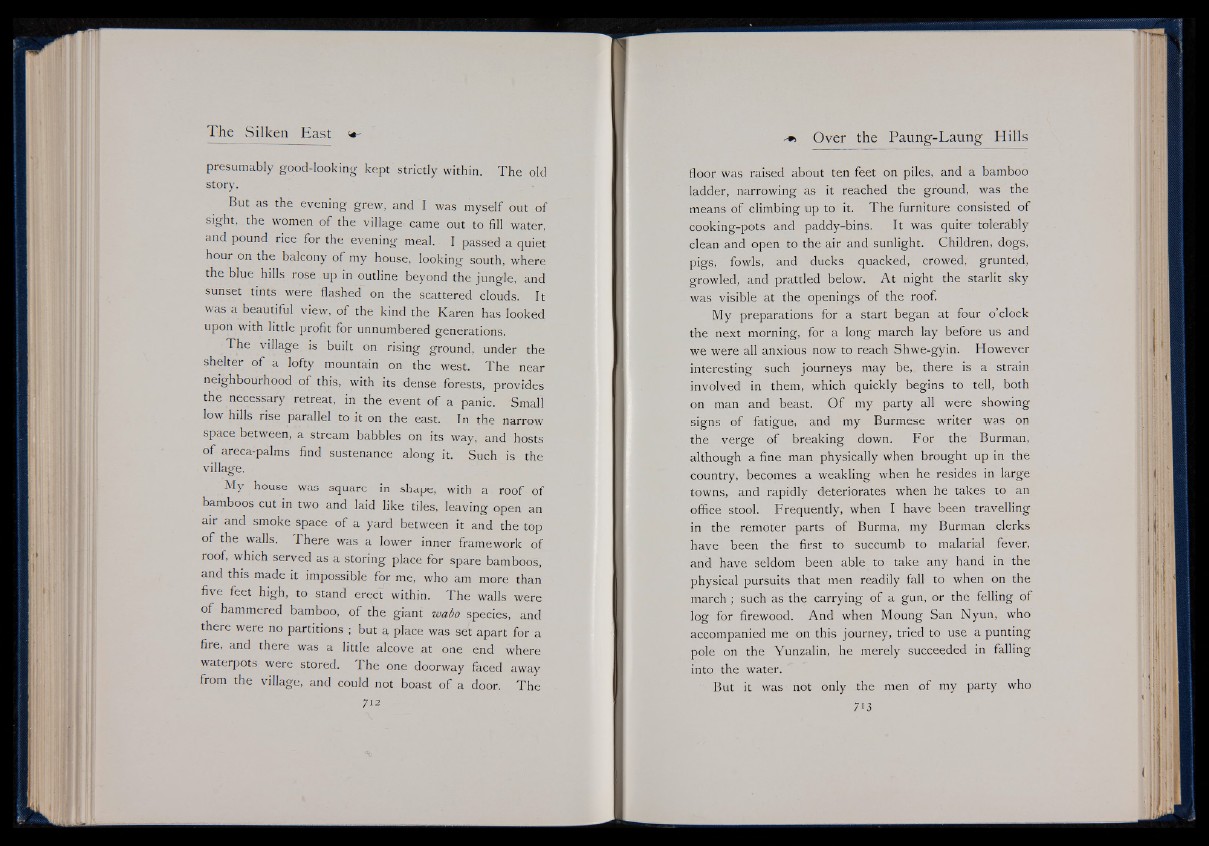
presumably good-looking kept strictly within. The old
story.
But as the evening grew, and I was myself out of
sight, the women of the village came out to fill water,
and pound rice for the evening meal. I passed a quiet
hour on the balcony of my house, looking south, where
the blue hills rose up in outline beyond the jungle, and
sunset tints were flashed on the scattered clouds. It
was a beautiful view, of the kind the Karen has looked
upon with little profit for unnumbered generations.
The village is built on rising ground, under the
shelter of a lofty mountain on the west. The near
neighbourhood of this, with its dense forests, provides
the necessary retreat, in the event of a panic. Small
low hills rise parallel to it on the east. In the narrow
space between, a stream babbles on its way, and hosts
of areca-palms find sustenance along it. Such is the
village.
My house was square in shape, with a roof of
bamboos cut in two and laid like tiles, leaving open an
air and smoke space of a yard between it and the top
of the walls. There was a lower inner framework of
roof, which served as a storing place for spare bamboos,
and this made it impossible for me, who am more than
five feet high, to stand erect within. The walls were
of hammered bamboo, of the giant wabo species, and
there were no partitions ; but a place was set apart for a
fire, and there was a little alcove at one end where
waterpots were stored. The one doorway faced away
from the village, and could not boast of a door. The
712
floor was raised about ten feet on piles, and a bamboo
ladder, narrowing as it reached the ground, was the
means of climbing up to it. The furniture consisted of
cooking-pots and paddy-bins. It was quite-tolerably
clean and open to the air and sunlight. Children, dogs,
pigs, fowls, and ducks quacked, crowed, grunted,
growled, and prattled below. At night the starlit sky
was visible at the openings of the roof.
My preparations for a start began at four o’clock
the next morning, for a long march lay before us and
we were all anxious now to reach Shwe-gyin. However
interesting such journeys may be,* there is a strain
involved in them, which quickly begins to tell, both
on man and beast. Of my party all were showing
signs of fatigue, and my Burmese writer was on
the verge of breaking down. For the Burman,
although a fine man physically when brought up in the
country, becomes a weakling when he resides in large
towns, and rapidly deteriorates when he takes to an
office stool. Frequently, when I have been travelling
in the remoter parts of Burma, my Burman clerks
have been the first to succumb to malarial fever,
and have seldom been able to take any hand in the
physical pursuits that men readily fall to when on the
march ; such as the carrying of a gun, or the felling of
log for firewood. And when Moung San Nyun, who
accompanied me on this journey, tried to use a punting
pole on the Yunzalin, he merely succeeded in falling
into the water.
But it was not only the men of my party who